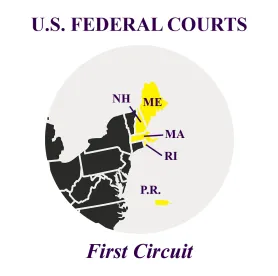First Circuit
Emmanuel v. Handy Techs., Inc., 2020 U.S. Dist. LEXIS 34066 (D. Mass. Feb. 27, 2020)
Court enforces clickwrap arbitration agreement formed on smartphone.
This decision involved a putative class action arising out of a wage-and-hour dispute where plaintiff alleged defendant misclassified him as an independent contractor under the Fair Labor Standards Act and the Massachusetts Wage Act. The court held a one-day bench trial on the issue of arbitrability and entered judgment against plaintiff. The court first considered whether the parties formed an agreement to arbitrate through “online contracts of adhesion.” The court concluded the terms of the agreement were reasonably communicated to plaintiff, who accepted the contract through a “clickwrap agreement,” even though plaintiff did not view the full text of the agreement. The court also determined that the arbitration agreement was not unconscionable. Even though the agreement was a contract of adhesion, that alone did not render it procedurally unconscionable, nor did the fact plaintiff viewed the agreement on a “tiny smartphone screen.” As to substantive unconscionability, the court found cost-splitting provisions did not render the agreement unconscionable because other terms and relevant arbitration rules allowed defendant to offer to pay for the arbitration costs, which defendant did here. The court also held that the unilateral modification clause was not a bar to enforceability because the court could sever any modification deemed unconscionable or otherwise unenforceable.
Conley v. Roseland Residential Trust, 2020 U.S. Dist. LEXIS 38275 (D. Mass. Mar. 5, 2020)
Class certification denied based on plaintiffs’ decision to forgo claims for actual damages.
In this putative class action brought by tenants against their former landlord and its billing contractor, plaintiffs alleged that defendants wrongly charged them for gas and water utilities by using unlawful “sub-metering” systems, which allegedly violated Massachusetts General Laws Chapter 93A (the Massachusetts Consumer Protection Act), and constituted negligent misrepresentation. Plaintiffs sought to certify a class of “[a]ll current and former residential tenants who [w]ere charged for gas, water and/or sewer submetered services by” the defendants based on the theory that the use of the submetered systems were unlawful because they did not comply with state law. In seeking certification, plaintiffs disavowed any claim for overcharges, focusing solely on the theory that the submetering systems were unlawful, thus entitling plaintiffs and the class to a refund. The court concluded that although commonality and predominance were satisfied because of plaintiffs’ narrow theory, adequacy and typicality were not. According to the court, plaintiffs, “in an effort to create the largest possible class, have eschewed any claim of actual pecuniary damages in order to mount an attack on” the sub-metering practice generally. The record, however, suggested at least some putative class members may have overpayment claims. Accordingly, in those circumstances, plaintiffs’ claims were not typical, nor were plaintiffs adequate representatives. Explaining that “adequacy and typicality are ‘particularly important because of the res judicata implications of a class judgment[,]’” the court denied class certification.
Savino v. Souza, 2020 U.S. Dist. LEXIS 61775 (D. Mass. Apr. 8, 2020)
Court grants class certification for claims by immigration detainees seeking declaratory and injunctive relief to require government to protect them from COVID-19.
Civil immigration detainees brought this putative class action alleging they were held in tight quarters and were unable to keep safe social distancing from others who may carry COVID-19. Plaintiffs asserted violations of due process as a result of confinement in conditions “that include the imminent risk of contracting COVID-19,” and violations of section 504 of the Rehabilitation Act for failure to provide reasonable accommodations, in the form of protection against COVID-19. Plaintiffs demanded release or implementation of social distancing and other hygienic practices recommended by infectious disease experts. The court granted their motion for class certification.
The court certified a class of all civil immigration detainees who were then held in custody in North Dartmouth, Massachusetts. The court rejected the government’s argument the court was barred from enjoining or restraining the “operation” of immigration enforcement actions except in their application to “an individual alien against whom proceedings under such chapter have been initiated” because the plaintiffs sought declaratory relief, which posed no obstacle to class certification. The court also rejected the government’s challenge to commonality and typicality, which was based on the argument that putative class members were not “similarly situated” because (i) they “are of different ages and all present different levels of health” at the time, (ii) some detainees were subject to statutorily mandated detention while others are not, and (iii) “each detainee presents a different risk of flight and/or public safety threat if released.” The court explained the variation did not defeat commonality or typicality because a common question of law and fact was “whether the government must modify the conditions of confinement—or, failing that, release a critical mass of Detainees—such that social distancing will be possible and all those held in the facility will not face a constitutionally violative ‘substantial risk of serious harm.’” According to the court, even perfectly healthy putative class members were seriously threatened by the virus.
Doucette v. CarMax Auto Superstores Inc., 2020 U.S. Dist. LEXIS 49639 (D. Mass. March 23, 2020)
Court grants motion to compel arbitration to avoid class-action claims because Federal Arbitration Act’s “transportation worker” exclusion did not apply.
A former employee brought this putative class action alleging his former employer failed to pay wages in violation of the Fair Labor Standards Act and the Massachusetts Wage Act. The court granted defendant’s motion to dismiss the complaint and compel arbitration pursuant to the Federal Arbitration Act (FAA) because, as part of the hiring process, plaintiff agreed to an arbitration agreement containing a class-action waiver.
The court rejected plaintiff’s argument the FAA’s “transportation worker” exemption applied and, as such, the FAA did not mandate arbitration of plaintiff’s claims. That exclusion exempts from FAA coverage “contracts of employment of seamen, railroad employees, or any other class of workers engaged in foreign or interstate commerce.” After analyzing the scope of the exclusion and whether plaintiff was engaged in interstate commerce, the court concluded the exemption did not apply as plaintiff was not engaged in the “transportation industry in interstate commerce.








 />i
/>i

